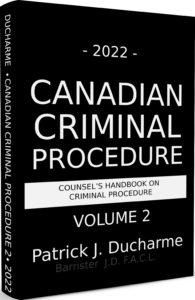 |
| Patrick Ducharme |
Full disclosure is fundamental to the right to make full answer and defence.1 The Crown has both a legal and ethical obligation to provide disclosure. While the Crown’s obligation is to make full disclosure, the defence also has an obligation request disclosure and to act responsibly in the course of the disclosure process.2 The defence begins the process with a request for disclosure and thereafter remains diligent about attempting to pursue additional disclosure.
Sometimes items sought by the accused are clearly beyond the realm of any reasonable disclosure demand. Disclosure demands might be characterized as irrelevant, or, “fishing expeditions”, seeking information of no or little relevance undermining the good faith and candour that should govern the conduct of counsel. For example, one court described counsel’s demand for “documentation from personnel files” of all Canadian and American police officers involved in the investigation as frivolous and abusive.3
No reasonable person would suggest that personnel records of all police officers involved in a criminal investigation should be turned over to the defence at the outset of a prosecution. It would be obvious to anyone that the prosecution would resist compliance with such a demand. Disclosure demands must not amount to calculated efforts to create needless controversy or waste valuable resources. Instead, disclosure requests should be aimed at assisting the accused to make full answer and defence to the charge or charges he faces.4
The Crown has a duty to disclose to the accused in a timely fashion all relevant material. This duty is based on the common law right of an accused to make full answer and defence and on the rights of an accused according to section 7 of the Charter.5 It must be interpreted, where reasonably possible, in accordance with the principles underlying the Supreme Court of Canada’s decision in Stinchcombe, that the Crown has a duty to disclose to the accused all information reasonably capable of affecting the accused’s ability to make full answer and defence, and to do so early enough to leave the accused adequate time to take any steps he or she is expected to take that affect or may affect such right.
This obligation has constitutional underpinnings deriving from s. 7 of the Charter that reflect the overriding concern that failure to disclose impedes the ability of the accused to make full answer and defence. This common law right has acquired new vigour by virtue of its inclusion in section 7 as one of the principles of fundamental justice.6
The Crown’s disclosure obligation is subject to discretion, with the burden of justifying the discretion resting on the Crown, to only withhold information that is: clearly irrelevant or the non-disclosure of which is required by the rules of privilege, or, to delay the disclosure of information out of the necessity to protect witnesses or complete an investigation.7 The Supreme Court of Canada made clear “[i]nasmuch as disclosure of all relevant information is the general rule, the Crown must bring itself within an exception to that rule.”8

The above is the an excerpt of Patrick J Ducharme's book, Canadian Criminal Procedure Volume 2, available at Amazon or in bulk through MedicaLegal Publishing along with Criminal Trial Strategies.
Subscribe to Patrick Ducharme's Youtube Channel
